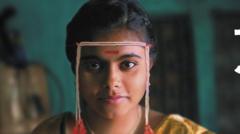The conversation surrounding marriage in India often romanticizes the idea of partnerships, but for many women, the realities can be starkly different. This is the central theme of "Sthal", a Marathi-language film set to release in Indian theaters after garnering acclaim at various film festivals. The narrative focuses on Savita, a young woman battling the ingrained patriarchal values of rural Maharashtra in her quest for education and a career.
Director Jayant Digambar Somalkar presents a film that echoes the sentiments of a society entrenched in arranged marriages, depicting the anxiety and humiliation women often face in matchmaking scenarios. The film juxtaposes a hopeful story of personal ambition against a backdrop where family expectations dictate a woman's worth. "He wants a good price for his crop and a good match for his daughter," Somalkar explains, emphasizing the pressure on fathers like Daulatrao Wandhare, Savita's father, to secure advantageous marriages.
The representation of Savita's plight is particularly riveting because it unfolds through the eyes of a largely inexperienced cast drawn from the same village where the story occurs. Lead actress Nandini Chikte's performance has already gained significant recognition, serving as a critical lens into the uncomfortable dynamics of arranged marriages.
Early scenes set a stark tone as Savita is judged by potential suitors and their families, facing questions on her appearance and education, revealing a society that prioritizes superficial qualities over individual aspirations. "I first want to finish college and then take civil services exams," Savita insists, illustrating her determination, yet her voice is overshadowed by the gendered norms of her community.
Chikte highlights the film's cultural significance, calling attention to the absurdity and degradation inherent in the matrimonial process, stating, "Marriage is given far too much importance in our society." The film also grapples with the deeply ingrained practice of dowry, shedding social critiques against a backdrop of personal storytelling, intertwining Savita’s seamless narrative with broader systemic issues.
Somalkar’s own experiences growing up in a family surrounded by women played a pivotal role in shaping the narrative of "Sthal". Witnessing arranged marriage customs firsthand, he found himself questioning the objectifying rituals of such traditions. His film hopes to challenge societal complacencies on this subject and stimulate discussions around the freedom of choice in marriage.
Though "Sthal" steps away from the glamorous depictions of weddings frequently portrayed in Indian cinema—like the popular Netflix series "Indian Matchmaking" or Bollywood blockbusters—its raw approach serves to illuminate the often hidden struggles of many women in the arranged marriage landscape.
As "Sthal" aims to be a catalyst for dialogue and reflection within society, Somalkar underscores the hope that through awareness, the narrative surrounding women's roles in marriage and career can begin to shift, paving the way for empowerment and choice.





















